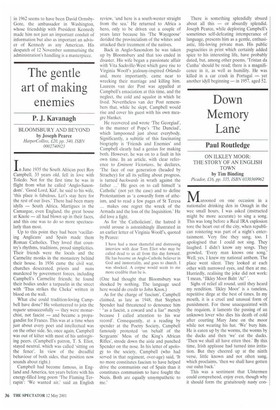The gentle art of making enemies
P. J. Kavanagh
BLOOMSBURY AND BEYOND by Joseph Pearce HarperCollins, 420, pp. 340, ISBN 0002740923 In June 1935 the South African poet Roy Campbell, 33 years old, fell in love with Toledo. Not for the first time he was in flight from what he called 'Anglo-Saxondom'. 'Good Lord, Kid', he said to his wife, 'this place is fabulous. Let's stay here for the rest of our lives.' There had been many idylls — South Africa, Martigues in the Camargue, even England, the great house at Knole — all had blown up in their faces, and this one was to do so more spectacularly than most.
Up to this point they had been 'vacillating Anglicans' and Spain made them Roman Catholics. They loved that country's rhythms, traditions, proud simplicities. Their friends were the locals and the Carmelite monks in the monastery behind their house. In 1936 came the civil war, churches desecrated, priests and nuns murdered by government forces, including Campbell's Carmelite friends; he found their bodies under a tarpaulin in the street with 'Thus strikes the Cheka' written in blood on the wall.
What else could tradition-loving Campbell have done? He volunteered to join the requete unsuccessfully — they were monarchist, not fascist — and became a propagandist for Franco. This was at a time when just about every poet and intellectual was on the other side. So, once again, Campbell was out of kilter with most of his unforgiving peers. (Campbell's patron, T. S. Eliot, stayed neutral, which was called 'sitting on the fence'. In view of the dreadful behaviour of both sides, that position now sounds about right.) Campbell had become famous, in England and America, ten years before with his energy-filled long poem 'The Flaming Terrapin': 'We wanted air,' said an English review, 'and here is a south-wester straight from the sea.' He returned to Africa a hero, only to be driven out a couple of years later because his 'The Wayzgoose' derided the provincialism of the whites and attacked their treatment of the natives.
Back in Anglo-Saxondom he was taken up by Bloomsbury and that too ended in disaster. His wife began a passionate affair with Vita Sackville-West which gave rise to Virginia Woolf s jealousy-inspired Orlando and, more importantly, came near to wrecking their marriage and killing him. Laurens van der Post was appalled at Campbell's emaciation at this time, and the neglect, the cold and squalor in which he lived. Nevertheless van der Post remembers that, while he slept, Campbell would rise and cover his guest with his own meagre blanket.
He recovered and wrote 'The Georgiad', in the manner of Pope's 'The Dunciad', which lampooned just about everybody. Significantly, a subtitle of this fascinating biography is 'Friends and Enemies' and Campbell clearly had a genius for making both. However, he was on to a fault in his own time. In an article, with clear reference to Eminent Victorians, he declares, 'The face of our generation (headed by Strachey) for all its yelling about progress, is turned backwards in wrath against the
father He goes on to call himself 'a Catholic' (not yet the case) and to define Protestantism as 'a cowardly form of atheism, and to read a few pages of St Teresa ... makes one regret the wreck of the Armada and the loss of the Inquisition.' He did love a fight.
As for 'the Catholicism', the hatred it could arouse is astonishingly illustrated in an earlier letter of Virginia Woolf s, quoted by Pearce: I have had a most shameful and distressing interview with dear Tom Eliot who may be called dead to us all from this day forward. He has become an Anglo-Catholic believer in God and immortality, and goes to church. I was shocked. A corpse would seem to me more credible than he is.
(One had thought that Bloomsbury was shocked by nothing. The language used here would do credit to John Knox.) As for the charge of 'fascism', Campbell claimed, as late as 1948, that Stephen Spender had threatened to denounce him ' "as a fascist, a coward and a liar" merely because I called attention to his war record'. Consequently, at a reading by spender at the Poetry Society, Campbell famously protested 'on behalf of the Sergeants' Mess of the King's African Rifles', strode down the aisle and punched Spender on the nose. In his letter of apology to the society, Campbell (who had served in that regiment, over-age) said, 'It no more constitutes fascism to have helped drive the communists out of Spain than it constitutes communism to have fought the Nazis. Both are equally unsympathetic to me.' There is something splendidly absurd about all this — or absurdly splendid. Joseph Pearce, while deploring Campbell's sometimes self-defeating intemperance of language, presents him as a gentle, enthusiastic, life-loving private man. His public pugnacities in print which certainly added spice to his interesting life, have probably dated, but, among other poems, 'Tristan da Cunha' should be read; there is a magnificence in it, as well as humility. He was killed in a car crash in Portugal — yet another idyll beginning — in 1957, aged 52.


































































 Previous page
Previous page